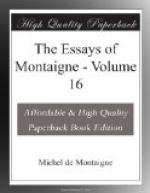in our comedies in some sort moves and gulls us.
That which I myself adore in kings is the crowd of
their adorers; all reverence and submission are due
to them, except that of the understanding: my
reason is not obliged to bow and bend; my knees are.
Melanthius being asked what he thought of the tragedy
of Dionysius, “I could not see it,” said
he, “it was so clouded with language”;
so most of those who judge of the discourses of great
men ought to say, “I did not understand his words,
they were so clouded with gravity, grandeur, and majesty.”
Antisthenes one day tried to persuade the Athenians
to give order that their asses might be employed in
tilling the ground as well as the horses were; to
which it was answered that that animal was not destined
for such a service: “That’s all one,”
replied he, “you have only to order it:
for the most ignorant and incapable men you employ
in the commands of your wars incontinently become
worthy enough, because you employ them”; to
which the custom of so many people, who canonise the
king they have chosen out of their own body, and are
not content only to honour, but must adore them, comes
very near. Those of Mexico, after the ceremonies
of their king’s coronation are over, dare no
more look him in the face; but, as if they had deified
him by his royalty. Amongst the oaths they make
him take to maintain their religion, their laws, and
liberties, to be valiant, just, and mild, he moreover
swears to make the sun run his course in his wonted
light, to drain the clouds at fit seasons, to make
rivers run their course, and to cause the earth to
bear all things necessary for his people.
I differ from this common fashion, and am more apt
to suspect the capacity when I see it accompanied
with that grandeur of fortune and public applause;
we are to consider of what advantage it is to speak
when a man pleases, to choose his subject, to interrupt
or change it, with a magisterial authority; to protect
himself from the oppositions of others by a nod, a
smile, or silence, in the presence of an assembly that
trembles with reverence and respect. A man of
a prodigious fortune coming to give his judgment upon
some slight dispute that was foolishly set on foot
at his table, began in these words: “It
can be no other but a liar or a fool that will say
otherwise than so and so.” Pursue this
philosophical point with a dagger in your hand.
There is another observation I have made, from which
I draw great advantage; which is, that in conferences
and disputes, every word that seems to be good, is
not immediately to be accepted. Most men are
rich in borrowed sufficiency: a man may say a
good thing, give a good answer, cite a good sentence,
without at all seeing the force of either the one
or the other. That a man may not understand all
he borrows, may perhaps be verified in myself.
A man must not always presently yield, what truth
or beauty soever may seem to be in the opposite argument;
either he must stoutly meet it, or retire, under colour




